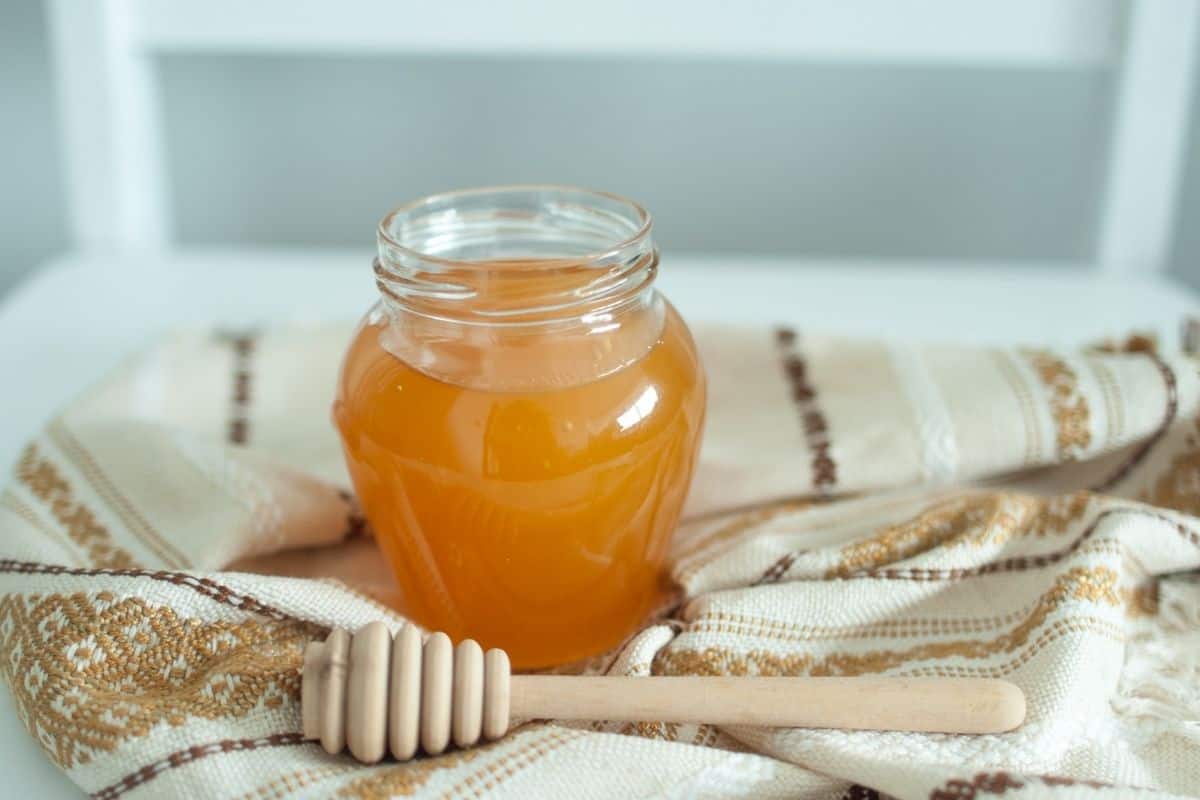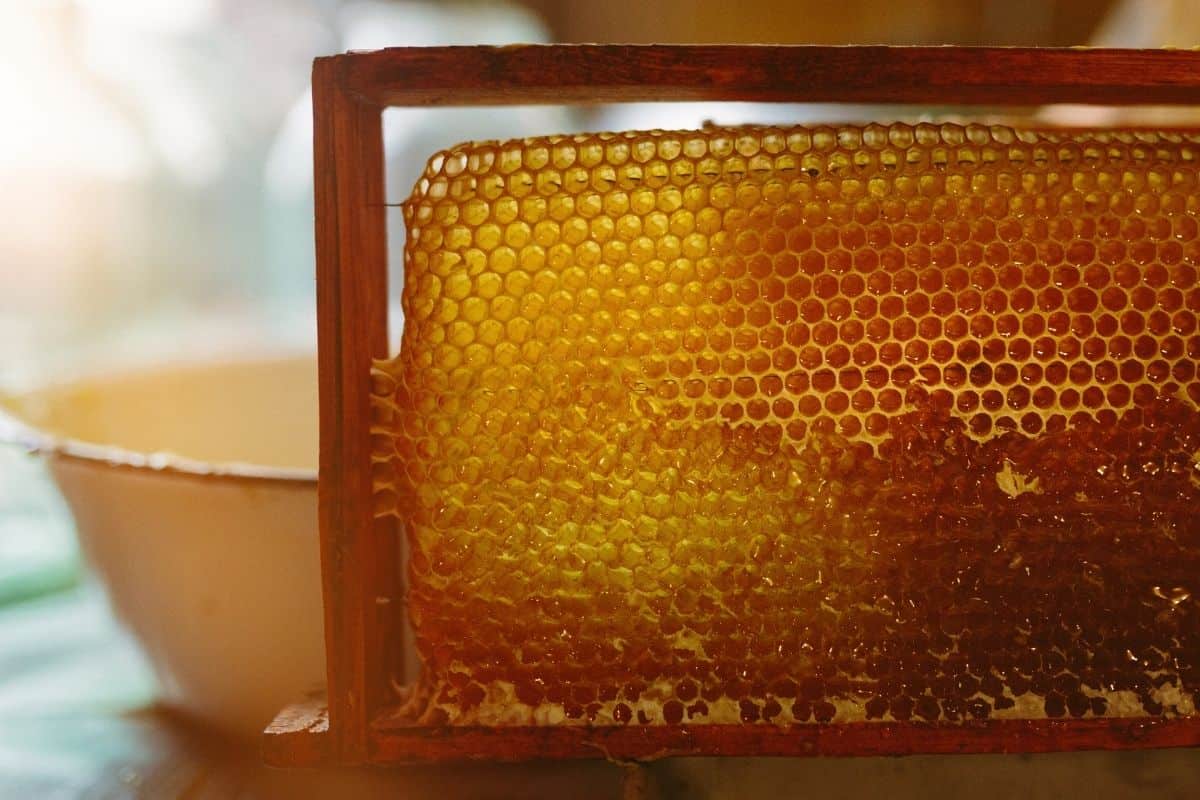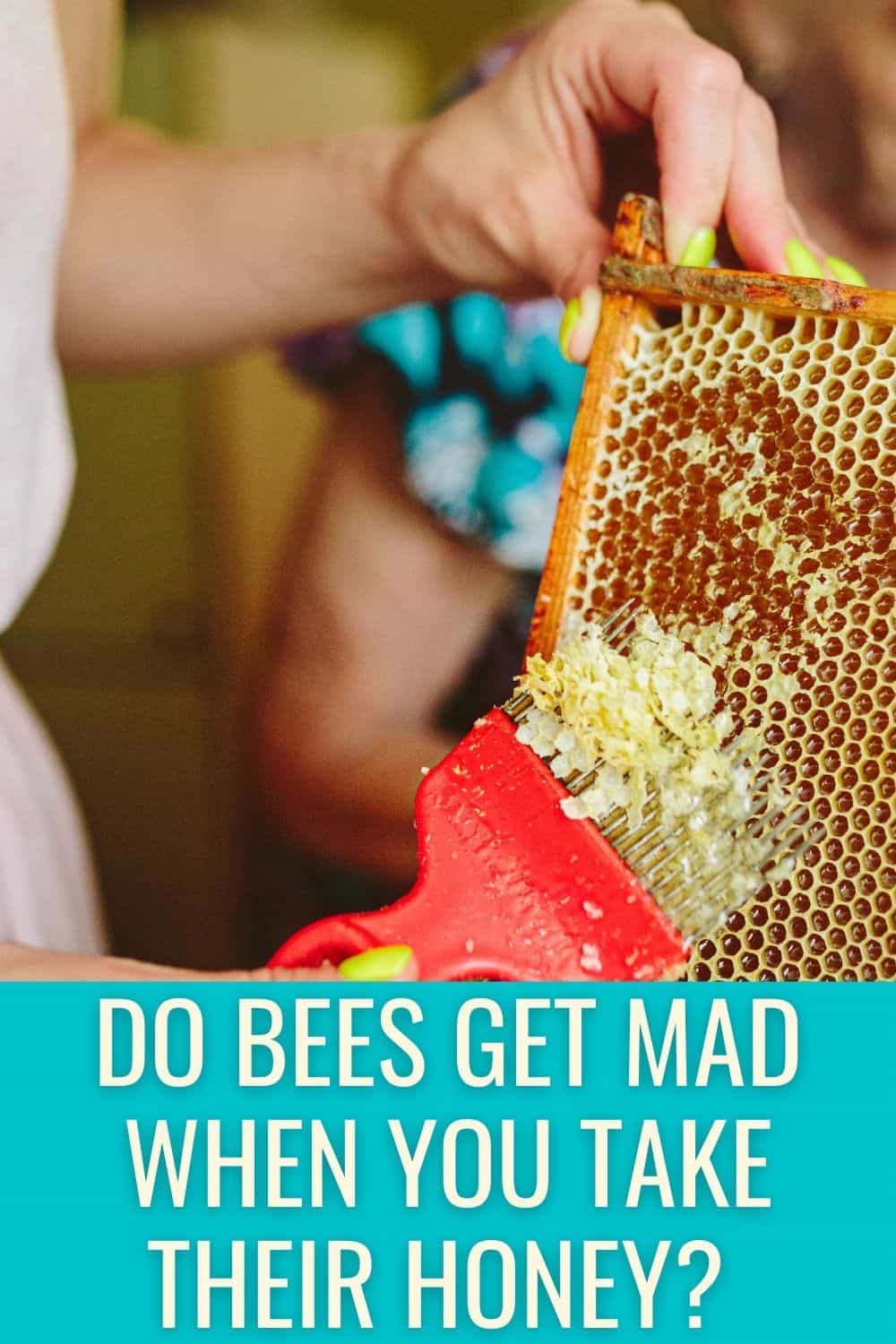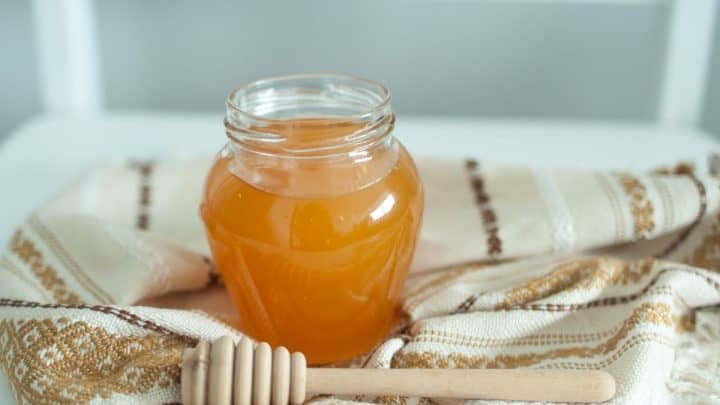Harvesting honey from their own beehives is a sweet and delicious reward for beekeepers. If you’re new to keeping bees, you might wonder: do bees get mad when you take their honey?
Harvesting honey does not anger or hurt the bees unless you are greedy and take too much. When done properly, bees are undisturbed when honey is harvested. Responsible beekeepers always leave enough honey for the hive. And while it’s not normal for bees to get irritated when you collect the honey, there can be factors that lead to aggression in bees.

How Is Honey Harvested?
Harvesting honey starts with suiting up for safety, then brushing off the bees from the honey frames. Next, pull the frames from the hive and use a knife to uncap the honey (cut away the wax). This wax can be used for candle making, so don’t throw it away.
Once your frames are uncapped, use a honey extractor to take the liquid honey out of a honeycomb without destroying the frame. Then strain the honey and enjoy it!
Some beekeepers use a smoker to calm their bees before opening the hive. Be careful not to overdo it, as the smoke may change the honey taste.
Instead, use a light sugar water spray to spray the bees gently: it distracts them while extracting the honey and keeps them busy cleaning themselves.
An escape board is something placed between the hive and the supers in a hive. At night after the day’s work, the bees will climb up through the escape board and make their way to the hive, and in the morning, they will make their way back to the honeycomb.
When the honey is harvested, the bees are used to going through the escape boards and will freely make their way back to the hive safely. The supers with the honeycomb attached can then be taken out to harvest the honey. There are no bees on the honeycomb when the honey is harvested.
Honey is not only delicious but is also good for you. Cal Orey has a great book about The Healing Properties Of Honey that includes lots of recipes and remedies.

When is Honey Harvested?
Honey harvesting usually takes place from June to mid-September, when the hives are most filled with honey. Harvesting can start when at least 80% of the frames are capped (but better when they are 90% capped).
Honeybees will only cap their honey when they know that it is ready. If you attempt to harvest the honey when it is uncapped, you will have raw nectar that has not had time to ferment and cure yet.
Uncapped honey’s water content is too high for it even to be called honey. If you bottle the uncapped nectar, you will end up with a runny syrup that will probably ferment and spoil.
How Much Honey Can One Beehive Produce?
Many factors can affect honey production, but a healthy beehive can produce between 10 to 150 pounds of honey per year. But there are also times when you might not even be able to harvest honey for that season.
Here are some factors that can influence your honey production:
- Weather conditions
- Rain throughout the season
- Location of the beehive
- Diseases and parasites
- Predators
- Competition from other colonies
- New beehive
- Amount of honey left for the bees for winter consumption
What Do Bees Eat When We Harvest Their Honey?
Most beekeepers will leave enough honey for their bees to eat during the cold winter months when bees cannot go out.
Honeybees collect less nectar and pollen when winter is on the way. At some point during this time, they will stop going out to forage. The honey left for the bees by beekeepers will sustain the colony through late autumn, winter, and early spring:
- A queen bee eats honey and royal jelly, a nutritious secretion that worker bees produce.
- Worker bees eat pollen and nectar, and the nectar can also be transformed into honey.
- Forager worker bees eat nectar when they fly out to the fields.
- The brood eats honey.
Pollen is stored in the beehive and caked in the honeycomb cells. When the forager bees cannot go out of the beehive in the winter, they eat the stored pollen and honey. The colony will reduce the number of brood in the hive, so in the winter, less honey is consumed.
7 Things That Will Make Your Bees Angry
There are some real reasons why bees sometimes get mad. An angry colony of bees is every beekeeper’s worst nightmare. If you notice your bees being aggressive and defensive, there might be underlying factors causing this behavior. Be careful if you need to get near the hive, as you’ll be surrounded by angry bees.
1. Weather
Hot, humid weather makes bees moody. Most seasoned beekeepers know that honeybees like calm days with lots of sunshine, and get moody when the days are windy, rainy, or cloudy.
2. No queen
When the queen dies or goes missing, the hive knows she’s gone immediately. They become defensive and aggressive as they try to re-queen the hive and remain protective until the new queen emerges, mates, and calms down the hive.
3. Opening the hive too much
Excessive hive inspections and handling of the frames alert the bees to become protective. Sometimes, after a thorough hive inspection, bees stay angry for a few days. If you want to inspect your hive and avoid angry bees, choose a late morning or early afternoon sunny day. Make sure you use your smoker to calm the bee’s nerves.
4. Angry queen
The queen’s temperament and personality are projected on all the other bees in the hive. If you have a nasty queen, your bees will behave in the same way. In this instance, it is advised to re-queen your hive.
5. Hunger
Bees who are thirsty and hungry can become cranky. Keep an eye on the pollen and nectar in your bees’ foraging fields and feed your bees if there is a shortage.
6. Predators
When predators like skunks and possums lurk around your hive, it will make your bees defensive. You might have to do some investigation to find the culprit who disturbs your bees at night. Skunks like to sit outside the hive at night during the summer when bees try to cool the hive by bearding, and eating the bees one by one until they have enough.
7. Crossbreeding
East African honeybees are genetically aggressive. When honeybees crossbreed, it is called Africanization. Crossbreeding between European or North American and East African bees creates an aggressive breed of a honeybee.
Young virgin queens will mate with drones flying around the area, adding their aggressive genetics to local colonies. It is still possible to have your colony Africanized even if you live in an area where Africanized bees are not found. If you suspect your virgin queen mated with drones, you should re-queen the hive with a mated queen and hope it changes the situation.
How To Calm Down Bees That Are Mad
Bees don’t fly around to just sting you. They only react defensively when they feel threatened. When you are inspecting your bees, it can be stressful for them. If you feel nervous or anxious while working with your bees, it can lead to stings, so it’s vital to remain calm while working with the bees.
Make sure you control your breathing slowly through your nose. When you breathe through your mouth, the bees might react and think you are a predator. Don’t blow air out forcefully or sigh deeply; carbon monoxide will fill the air, which is also a trigger for bees.
Check the area around your hive to make sure everything is calm before you open your hive. If people or animals are around plowing or mowing and other activities, wait to inspect your hive another day. Wear a bee suit for protection; it helps you stay calm when you know the bees can’t sting you.
Here are a few points to remember when handling your bees:
- Be gentle and take your time
- Stay calm and relaxed when working with the bees
- Don’t over inspect the hives
- Pay attention to the weather and try to do your work on sunny days
- Use a bee smoker correctly
- Wear white
In Conclusion, Do Bees Get Mad When You Take Their Honey?
Mindful beekeepers are always making sure their bees are not stressed or harmed during honey harvesting. A good beekeeper only takes the honey they need and always leaves some honey for the bees as food. Honeybees produce a lot of honey, way more than they can consume, so taking the extra honey doesn’t hurt them or make them mad.



